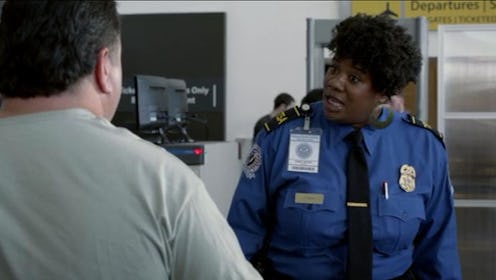Entertainment
Adrienne C. Moore On the Evolution of Black Cindy

Of the many flashbacks Orange is the New Black has featured over the course of its two seasons, some have been eye-opening, others heartbreaking, but few have been simply as fun as the one that showed the pre-prison, kleptomaniac life of Black Cindy. As played by Adrienne C. Moore, Cindy, before Litchfield, was a loud-mouthed, obnoxious, blissfully content TSA agent with a habit of stealing travelers' valuables — and, in one memorable scene, taking advantage of her power and and making some particularly good-looking passengers' travels a bit, um, intimate.
"The airport scene was so much fun," Moore says, "just being at the airport in a different perspective, not as a passenger but as an employee working there."
In a "true testament" to the show's crew, Moore says that although she was nervous about filming some potentially uncomfortable scenes, such as that now famous pat-down, the experience was completely relaxed. And as for any awkwardness between her and the man (Jerry Ford) she had to feel up? It all went away the moment Moore realized that Ford was a mutual friend.
"So I was looking for a trainer at that time, and I was talking to my friend, and he was like, well, you know, that guy [you worked with]...," Moore recalls. "So now he [Ford] trains me! I actually had a training session with him this morning."
"Third degree of separation," she continues, laughing. "It's funny how that one little moment has turned into him being my friend, and my trainer."
Yet the airport experience was nothing compared to the scenes shared between Moore and her character's daughter, Monica (Donshea Hopkins). The actress says that these moments, in which Cindy's fraught, irresponsible relationship with her child became clear, were harder to film than practically any others she'd done.
"Children is a big difference between myself and Cindy, because I love children," Moore says. "I have a huge love for kids, and then to see Cindy, who couldn’t care less to the point where she’s disowning her child — that was a little hard for me."
Still, discovering Cindy's past was "exciting," Moore says, not to mention enlightening. Learning what Cindy was like before prison — carefree, immature, hungry for power — gave insight into the woman she's become at Litchfield, especially since Vee's arrival.
"I think every actor wants some opportunity to sink their teeth into something," Moore says," to develop a storyline, to develop their character. To see more how she sees racism, and how she sees politics... she talks about who the real criminals are, and then taking that and being introduced to Vee, who's this — for lack of a better word — psychopath... I think she learns."
As do Moore's fans, many of whom once bonded with the actress over Cindy's humor and fun-loving attitude, but now tell her more seriously that the character and her struggles remind them of their mothers, or sisters, or even themselves.
"Honestly, to me, that’s the biggest gift from fans," Moore says. "There was this one gentleman — and I love it when guys hook onto the show — he said, 'I just got out of prison,' and he had fallen upon this show. He said, 'I really did connect with that character and just in general, you all did a really good job in painting the picture of what prison is like.' And that, to me, is a gift, because sometimes, you can get kind of caught up in the television/film world and you’re just thinking, well is this really what goes on? And so it’s really great when folks say that what you’re doing reflects what I’ve experienced or reminds me of myself or something like that."
For Moore, connecting with Cindy is fairly easy; both women "always try to find the humor in life," especially when it concerns difficult situations.
"You don’t want to be defined by pain and tough choices," she says, "but you want to learn from them, and grow from them, and move on from them. And often, if you can find the humor in that moment or that situation, then it’s like, oh, okay, I can move on from this and it won’t define me or hold me for the rest of my life."
Otherwise, Moore hopes she's not too similar to her character, at least where her attitude is concerned.
"I think Adrienne can be a little to the point and blunt, or truthful or honest, but maybe not as brazen as Cindy is," she says, laughing. "I try to find ways to soften it, politeness! But she’ll just say it. She doesn’t care if it hurts a feeling or not."
Sometimes, though, it's a bit too easy for Moore to take on the persona of her character, especially when improv is involved.
"I have to catch myself!" she says. "Sometimes I’ll get a little too into that improv... we were working on something the other day and Black Cindy was just like, letting loose, and our AD was like, 'Adrienne? You want to slow down a sec?' and I was like, 'I’m sorry, I’m just in my Black Cindy mode!"
Images: Netflix (3)